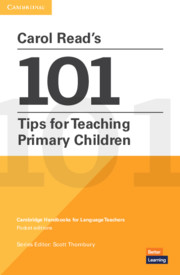Book contents
- Frontmatter
- Contents
- Acknowledgements
- Why I Wrote this Book
- A Getting Started
- B Core Skills
- C Classroom Management
- D Lesson Planning
- E Learning how to Learn
- F Storytelling
- G Playing Games
- H Values Education
- I Songs, Rhymes, Chants and Raps
- J Working with Projects
- K Intercultural Competence
- L Content-Based Learning (CLIL)
- M Thinking Skills
- N Vocabulary
- O Life Skills
- P Art, Craft and Design
- Q Mime and Drama
- R Inclusion and Diversity
- S Creativity
- T Adapting or Writing Materials
- U Listening and Speaking
- V Reading and Writing
- W Multiliteracies
- X Grammar
- Y Assessment
- Z The Last Word
- Glossary
- Selected Further Reading
- Index
N - Vocabulary
Published online by Cambridge University Press: 28 October 2023
- Frontmatter
- Contents
- Acknowledgements
- Why I Wrote this Book
- A Getting Started
- B Core Skills
- C Classroom Management
- D Lesson Planning
- E Learning how to Learn
- F Storytelling
- G Playing Games
- H Values Education
- I Songs, Rhymes, Chants and Raps
- J Working with Projects
- K Intercultural Competence
- L Content-Based Learning (CLIL)
- M Thinking Skills
- N Vocabulary
- O Life Skills
- P Art, Craft and Design
- Q Mime and Drama
- R Inclusion and Diversity
- S Creativity
- T Adapting or Writing Materials
- U Listening and Speaking
- V Reading and Writing
- W Multiliteracies
- X Grammar
- Y Assessment
- Z The Last Word
- Glossary
- Selected Further Reading
- Index
Summary
For most children, learning new words is motivating and gives them a tangible sense of progress. It also supports their ability to interact and express personal meanings using a limited range of language chunks or grammatical structures.
However, learning vocabulary is more complex than it seems. Children need to recognise a word when spoken and decode it when written. They need to understand the meaning of the word and how it relates to other words, for example, the difference between small and tiny. They need to know how a word is used grammatically, for example, we say she's a good swimmer but not she swims good, and how it collocates with other words, for example, we say a high mountain but not a high person. Children need to be able to recall the word and know how to say it and spell it. Depending on their age, children also need to know the grammar of the word, for example, whether it is a noun or adjective, and be aware of register.
Children's vocabulary learning is influenced by their other languages and cultural background. As children develop greater maturity during the primary years, they also bring new understanding to vocabulary in English and this influences their learning too.
Children learn vocabulary through frequent, repeated exposure in meaningful contexts which allow opportunities for personal and social interaction and experiential use.
My key tips for vocabulary are:
53 Move from concrete to abstract
54 Recycle frequently
55 Develop vocabulary learning strategies
56 Don't over-focus on spelling!
53 Move from concrete to abstract
It's usual to teach concrete vocabulary first and leave more abstract vocabulary until children develop greater cognitive maturity. In either case, make sure that the meaning is clear and encourage children to notice the form.
Concrete vocabulary refers to items that relate closely to children's lives and that they can see, touch or act out in the immediate here and now of the classroom. Examples include classroom objects, food, actions and animals. Abstract vocabulary refers to items that are harder to illustrate and typically include more verbs, adjectives and adverbs than nouns. When teaching vocabulary, you need to use appropriate ways to make sure that the meaning is clear.
- Type
- Chapter
- Information
- Carol Read’s 101 Tips for Teaching Primary Children , pp. 66 - 70Publisher: Cambridge University PressPrint publication year: 2020



